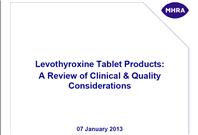I report this exactly as on the MHRA web site - without comment. I encourage you to both read what is below and the actual report (link to PDF):
MHRA publishes a report on levothyroxine tablet products: A review of the clinical and quality considerations
In response to concerns expressed by patients and healthcare professionals regarding potential inconsistencies in the quality and effectiveness of levothyroxine products, the MHRA conducted a review. Recommendations from this review were endorsed in March 2012 by the Commission on Human Medicines, an independent panel of experts who advise the licensing authority. These include more stringent controls of quality, including the introduction of a discriminatory dissolution test in the British Pharmacopoeia (BP) Monograph and tighter regulatory controls.
Levothyroxine tablet products: A review of clinical and quality considerations
mhra.gov.uk/home/groups/pl-...
Questions and answers
General
1. Why is the MHRA publishing this report?
Over recent years, the MHRA has received reports from prescribers and patients of problems with levothyroxine tablets, mostly concerning the quality or effectiveness of the product. The numbers of reports were very small in relation to the number of patients taking this medicine, nevertheless they were persistently received. In January 2011 the MHRA decided to undertake a detailed investigation into possible underlying reasons for these reports that might be connected to the known sensitivity of the drug substance, levothyroxine. The findings were presented to the Commission of Human Medicines for their consideration.
2. Who are the Commission on Human Medicines (CHM) and in what situations does it make recommendations to the MHRA?
The Commission on Human Medicines is an independent panel of experts with whom the licensing authority (MHRA) consults to obtain advice on the safety, quality and efficacy of medicines. The CHM may make recommendations to the licensing authority on particular medicines under consideration. Further information about the CHM is published on the MHRA’s website:
Commission on Human Medicines
mhra.gov.uk/Committees/Medi...
3. What recommendations did the CHM make for levothyroxine products?
The CHM made several recommendations aimed at improving the quality and consistency of levothyroxine products. A key recommendation was the introduction of a new discriminatory dissolution test that all products will have to meet when tested.
4. Why is the levothyroxine dissolution test important?
Dissolution is a way of testing that the levothyroxine drug is able to adequately dissolve out of the tablet and be available in solution for absorption from the gut. If the drug doesn’t completely dissolve, then it may not be fully absorbed by the body to give an optimal clinical effect. A dissolution test was developed by the MHRA. Although we cannot be certain that this test is predictive of what will happen in the body, all levothyroxine tablets on the UK market were shown by this test to have satisfactory dissolution apart from one make (Teva levothyroxine 100 microgram tablets). Teva levothyroxine 100 microgram tablets have since been withdrawn from the UK market.
5. Where can I get more information about the Teva levothyroxine 100 microgram tablet?
The MHRA consulted with the CHM over the Teva levothyroxine 100 microgram tablet on 9 February 2012 and this led to the suspension of the marketing authorisation of this product on 19 February 2012. The MHRA expects to publish a report on this CHM review by end February 2012.
6. When will the new dissolution test be applied to levothyroxine products?
The dissolution test will shortly be included in the BP monograph for Levothyroxine Tablets. This will become a legal requirement once published by the BP. The timescale for this is expected to be about January 2014. More information about the revised monograph for levothyroxine tablets is available on the BP website:
Revised Monographs (external link)
pharmacopoeia.gov.uk/custom...
Prescribers
7. In the recommendations it states: ‘…brand or named supplier prescribing is not considered necessary at this stage, but should be kept under review.’ Will the CHM be keeping this under review and issuing further guidance? And if so when is this likely to be?
All the recommendations made by the CHM to improve the quality of levothyroxine tablets have been taken forward by the MHRA and the BP Commission. Earlier this year, the MHRA met with each manufacturer of levothyroxine tablets to give them notice of these recommendations to ensure they are implemented. CHM did not recommend named or brand prescribing because the recommendations were considered to be adequate measures to ensure the quality and consistency of levothyroxine tablets that remain on the UK market. The MHRA are closely monitoring all reports of adverse events following suspension of the Teva Levothyroxine 100 microgram Tablet. Since removal of this product from the market, there are no clear signals suggesting that the levothyroxine products that remain on the UK market are inequivalent.
The MHRA will continue to review reports and consult with the CHM when necessary.
Patients
8. What should patients on levothyroxine do now?
If you are taking levothyroxine you do not need to take any action. Most patients on levothyroxine will have regular blood test to inform their GP that their hypothyroidism is controlled and whether any adjustment is needed to their treatment.
However, if you have any concerns over your treatment you should discuss these with your GP, practice nurse or pharmacist.
9. Where can I get more advice on this subject?
If you have any other questions regarding this review you should discuss them with your GP, practice nurse or pharmacist.
Please also continue to visit the MHRA website.
mhra.gov.uk/Safetyinformati...
Rod

